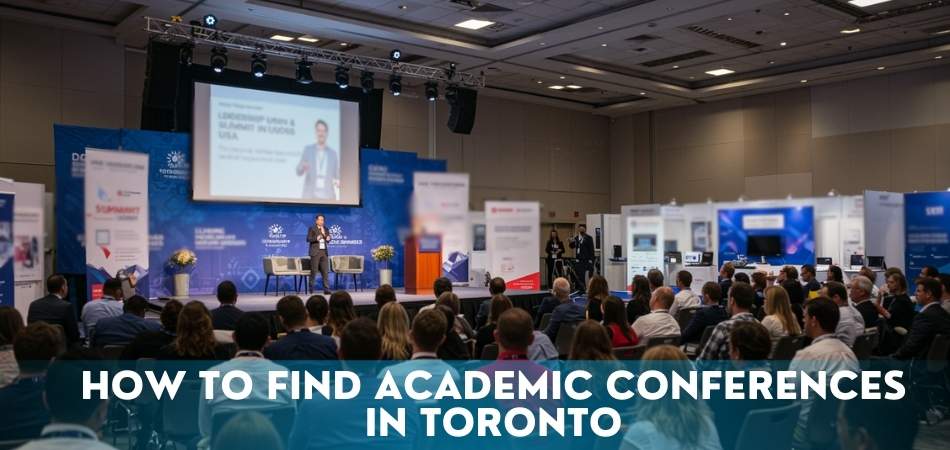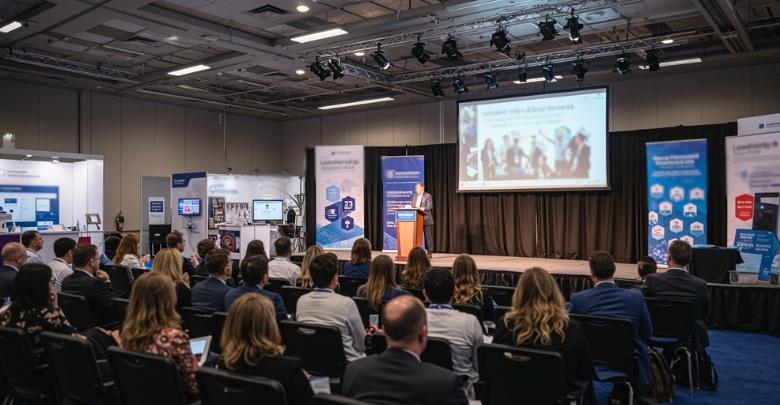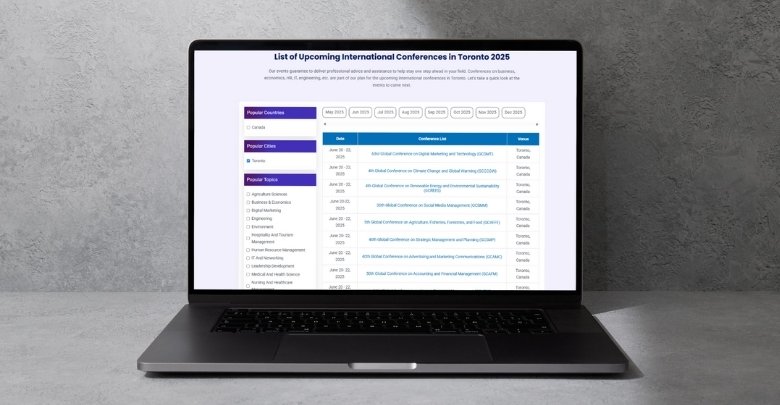Toronto is an active hub for professionals and researchers, hosting multiple conferences throughout the year. With so many conferences available, academic events in Toronto have gained significant popularity in recent years, attracting global experts and innovators. That raises a common question: How to find academic conferences in Toronto?
To find academic conferences in Toronto, use platforms like Eventbrite and Global Conference Alliance Inc. Filter results, visit university websites, check academic journals, and join professional associations. Subscribe to newsletters and follow LinkedIn groups for real-time updates and upcoming event schedules.
If you are interested in this topic, you have come to the right place. You will find all the tips you need in this article, from online platforms to local universities. This is an easy-to-follow article that gives you all the details you need to stay informed about academic conferences in Toronto.
How to Find Academic Conferences in Toronto? Simple Methods to Follow
Keeping up with academic conferences in Toronto can be tricky, but there are several easy ways to do it. No matter what your field or desire, it’s simple to find events once you know where to look. Check out the tips below if you want to stay informed and discover the best events in your city.

Online Platforms
The internet is your best friend when it comes to finding conferences. Websites like Eventbrite and Global Conference Alliance Inc. are perfect for searching events happening in Toronto. You can use filters to find academic conferences that match your interests. Just type in the topic you’re looking for and see what pops up. It’s quick, simple, and super helpful.
University Websites
Universities in Toronto are always hosting conferences and events. Checking their official websites can help you find the future conferences in Toronto that match your interests. They usually list upcoming conferences on their event calendars. It’s a smart idea to visit their sites regularly or even sign up for alerts. Check out the schedule to make sure you don’t miss out on a cool event!
Academic Journals
If you’re looking for something more specific, academic journals can be useful. They often announce upcoming conferences related to their research topics. It might sound boring, but it’s actually a great way to find events that are really focused on what you like. Plus, you can read more about the topics before deciding to attend.
Professional Associations
Joining a professional group related to your interests can be a game-changer. Many of these associations host conferences or at least announce them. They often have newsletters or mailing lists you can join for free. Keeping up with their updates can help you stay in the loop and never miss a big event.
Newsletters
Newsletters are like little reminders that come straight to your inbox. Many websites and organizations send newsletters about upcoming conferences. You just need to subscribe, and the information will come to you. It’s a super easy way to stay updated without much effort.
LinkedIn Groups
Believe it or not, LinkedIn is more than just a place for resumes. There are tons of groups on LinkedIn that focus on different fields and interests. Joining these groups can help you discover conferences happening in Toronto. Plus, you might even make some new friends with the same interests.
Word of Mouth
Sometimes, the old-school way works best. Ask around! If you know people who are interested in similar topics, see if they’ve heard about any good conferences. Friends, teachers, or even online communities can be great sources of information. It’s amazing what you can find out just by asking.
Why Check Academic Journals for Finding Conferences in Toronto?
Academic journals are more than just boring research papers. They can actually be super useful when you’re trying to find conferences in Toronto. Most people skip over them, but they’re like hidden gems for event information. Keep reading to find out why they matter.
Announcements and Ads
Academic journals often include announcements about upcoming conferences. It’s a way for researchers and organizers to reach the right audience. You might find small ads or detailed announcements about events happening in Toronto. They are usually related to the topics the journal focuses on, making them really relevant. Checking journals can save you a lot of time searching.
Reliable Information
Journals are known for being accurate and reliable. If a conference is listed there, it’s usually legit. You won’t have to worry about stumbling into fake events or scams. Organizers prefer announcing their conferences here because it reaches people who care about the same topics. It’s a safe and trusted source of information.
Specific Topics
If you’re interested in a certain topic, journals are perfect. They usually focus on specific subjects, so the conferences listed will be related to what you like. Instead of looking through random events, you can find ones that actually interest you. It’s a great way to find conferences that match your interests perfectly.
Extra Details
Journals often provide more than just a date and location. They include details like the theme of the conference, guest speakers, or even registration links. This extra information helps you decide if it’s worth attending or not. It’s like getting a sneak peek of the event before you even go.
Easy Access
You can find journals online or in libraries without much trouble. Many are even free to read, especially if you look for open-access ones. It doesn’t take long to skim through the latest issues to see if any conferences are listed. It’s a simple and quick way to gather good information.
How Often Should You Check University Websites For Academic Conferences in Toronto?
When looking for academic conferences in Toronto, checking university websites regularly is essential. Many universities update their event listings frequently, sometimes weekly or monthly. New conferences and workshops are posted as soon as they are announced. By visiting these websites often, you can stay on top of upcoming events and never miss out.
It’s a good idea to check university sites every few days, especially during the academic season. Many conferences are planned months ahead, but they can also pop up at the last minute. You might find a newly announced conference or a change in event dates. Regular visits help you stay informed and up-to-date on the latest opportunities.
In addition to regular checks, subscribing to university newsletters is a smart move. Many universities offer email updates with information on upcoming conferences and events. This way, you don’t have to manually check the website each time. Subscribing ensures you get timely notifications directly in your inbox.
Attending a Toronto Academic Conference: What Should You Expect?
Going to an academic conference in Toronto can be both exciting and a bit overwhelming. You’ll meet new people, hear interesting talks, and learn a lot. But if it’s your first time, you might not know what to expect. Keep reading to find out what usually happens at these events.
Registration and Check-In
The first thing you’ll do is register and check in at the conference venue. This usually involves getting a name tag and a schedule of the day’s events. Be sure to arrive early to avoid long lines. You might also get a welcome kit with some useful items and information. It’s a good idea to double-check the schedule for any last-minute changes.
Keynote Speeches
Most conferences start with a keynote speech by an expert in the field. These talks set the tone for the event and usually focus on the main theme. The speaker might share new research, insights, or even personal stories related to the topic. It’s a great way to get inspired and understand the purpose of the conference. Try to grab a seat early to get a good view.
Workshops and Sessions
After the keynote, there are usually smaller workshops and sessions you can attend. Each session covers a specific topic and is led by a speaker or a panel of experts. You’ll get a chance to learn about new ideas or research in a more detailed way. Make sure to pick sessions that match your interests to get the most out of the experience. You might also have a chance to ask questions or participate.
Networking Opportunities
Conferences are a great place to meet people who share your interests. When you attend academic conferences in Toronto, you’ll find many opportunities to connect with experts and fellow learners. During breaks or lunch, you’ll see groups of people chatting and exchanging ideas. Don’t be shy to introduce yourself and join in. You might make some valuable connections or even new friends.
Presentation and Feedback
If you’re presenting, expect to share your work in front of an audience. After your talk, there might be a Q&A session where people ask questions or share thoughts. It’s normal to feel a bit nervous, but most audiences are supportive. Be clear, confident, and open to feedback. Listening to others’ presentations can also give you ideas for future projects.
Best Way to Join Associations in Toronto To Stay Updated On Conference
Joining associations in Toronto is a great way to stay in the loop about academic conferences. These groups offer valuable resources and help you keep track of events happening in the city. Let’s explore how you can join and benefit from them.
Research Associations
The first step is to research which associations match your interests. Toronto has many professional groups that focus on different fields. You can find these groups through online searches or by checking out local universities. Once you find a few, learn about their membership benefits and what they offer.
Check Their Websites
Most associations have websites where you can find information about joining. These websites usually list upcoming conferences and events that their members can attend. You’ll also find details about membership fees, services, and the benefits of being a part of the group. Be sure to look for any upcoming deadlines or special events.
Sign Up for Newsletters
Many associations send newsletters to their members, keeping them updated on the latest conferences. Signing up for these newsletters is an easy way to stay informed. You’ll get all the important information delivered right to your inbox. It’s a hassle-free way to find out about upcoming conferences and events.
Attend Events
Once you’ve joined, make sure to attend the events they organize. These can be webinars, meetings, or even in-person conferences. Attending these will help you connect with like-minded individuals and learn about more events. It’s also a great way to stay involved with the latest trends in your field.
Network with Members
Being an active member of an association gives you the chance to network with others. Connecting with other members can lead to discovering even more conferences and opportunities. They can share tips, and events, and even invite you to attend with them. Networking helps you stay updated and build a strong professional community.
How Reliable Are Friends in Finding Conferences in Toronto?
Friends can be quite helpful when looking for conferences in Toronto. They often share useful tips and recommendations based on their experiences. Sometimes, they even know about events that aren’t advertised online. Word of mouth can be surprisingly effective for finding conferences.
Their recommendations are especially useful if they share the same interests or study similar topics. For example, when finding business conferences in Toronto, friends who attend them regularly can offer valuable suggestions. They might even invite you to attend events with them. Friends can help you discover conferences you might have missed.
However, relying only on friends for finding conferences isn’t always the best idea. Their knowledge is limited to their own experiences and interests. They might not always know about new or specialized conferences happening nearby. It’s great to use your friends’ advice, but make sure you combine it with your own research.
FAQs About How to Find Academic Conferences in Toronto?
A wide selection of academic conferences in Toronto can make finding the right one difficult. To make things easier, here are some of the most common questions people ask about discovering and attending academic conferences in Toronto.
What Are The Best Months To Find Academic Conferences In Toronto?
The best months to find academic conferences in Toronto are usually between April and October. During this time, many universities and associations host events, taking advantage of pleasant weather. Summer conferences are popular due to vacation periods and higher attendance rates. Checking conference schedules around these months can provide more options.
Are Local Libraries Useful For Finding Academic Conferences In Toronto?
Local libraries can be surprisingly helpful when looking for academic conferences in Toronto. Many libraries have bulletin boards, brochures, or newsletters featuring local events. Additionally, librarians can guide you to resources or websites listing upcoming conferences. Checking local library event boards regularly can be a smart move.
How To Use Social Media To Find Conferences In Toronto?
Social media platforms like Twitter, Facebook, and Instagram are excellent tools for finding conferences. Search for conference-related hashtags, follow event organizers, and join discussion groups. Many organizers promote their events through social media, providing updates and registration links. Staying active on social platforms can uncover useful information.
What Are The Signs Of A Reliable Conference Listing?
Reliable conference listings usually come from reputable organizations, well-known associations, or respected academic websites. Look for official URLs, proper contact information, and detailed descriptions. If the listing provides a registration link, make sure it’s secure. Checking reviews or testimonials can also confirm reliability.
How To Identify Scam Conferences In Toronto?
Unfortunately, scam conferences exist and can waste your time and money. Signs of a scam include poor website design, vague information, or overly aggressive marketing. Double-check the event’s credibility by searching for reviews, contacting organizers, or confirming with reputable academic groups. Never pay fees without proper verification.
Are Hybrid Conferences Common In Toronto?
Hybrid conferences, which offer both online and in-person attendance, are becoming more popular in Toronto. They provide flexibility for those who can’t travel. Many reputable conferences now offer virtual options, making it easier to attend from anywhere. Always check the event’s official site for such details.
How To Use Google Alerts For Conference Updates?
Setting up Google Alerts is a smart way to stay informed about conferences in Toronto. Simply enter keywords like “academic conferences in Toronto” and receive notifications when new articles or events are posted. Adjusting your alert settings ensures you get relevant information without spam.
Bottom Line
When you have the right approach, finding academic conferences in Toronto is easier than it seems. By using online platforms like Eventbrite, checking university websites, and subscribing to newsletters, you can stay updated on events. Joining professional associations and checking academic journals also provide valuable resources.
Aside from that, word of mouth from friends can be a helpful tool for discovering conferences, but it’s important to do your own research. If you’re still wondering how to find academic conferences in Toronto, these strategies will guide you to the best events. Stay proactive and use multiple sources to ensure you don’t miss out on any exciting opportunities.







